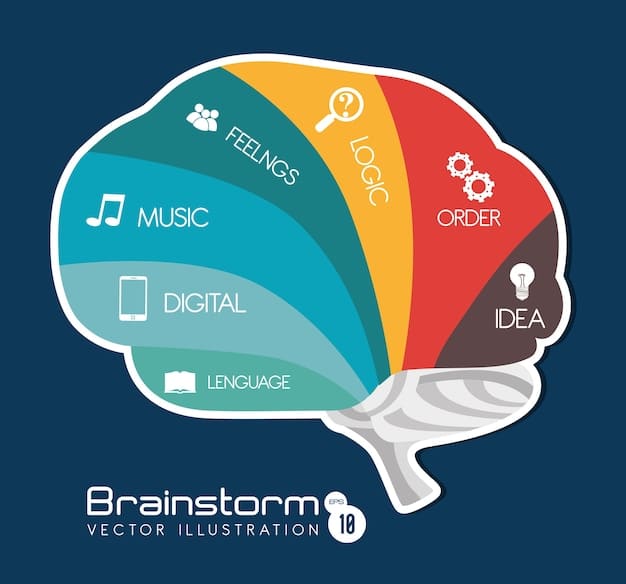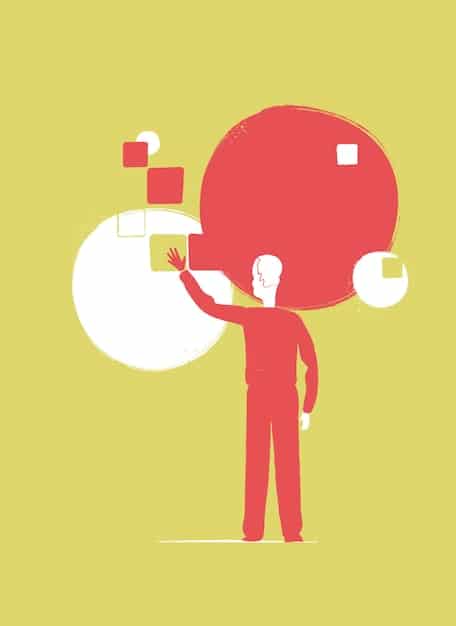The Science of Focus: Task Management & Brain Performance

The science of focus reveals how effective task management profoundly impacts brain function and performance by reducing cognitive load, enhancing attention, and optimizing neural pathways for sustained productivity and mental clarity.
How often do you find yourself multitasking, feeling overwhelmed, or struggling to concentrate on a single task? In today’s fast-paced world, maintaining focus can feel like an Olympic sport. Yet, understanding The Science of Focus: Understanding How Task Management Impacts Your Brain and Performance is not just about productivity; it’s about optimizing your cognitive capabilities and achieving peak performance.
The Brain’s Operating System: How Focus Works
The human brain is an incredibly complex organ, constantly processing information. But its capacity for deep, sustained focus is finite. Understanding how our brain prioritizes and executes tasks is crucial for effective management. This section explores the underlying neurological mechanisms that govern our attention and concentration.
Neural Networks and Attention
Our ability to focus largely depends on the interplay between various neural networks. The default mode network (DMN) is active during mind-wandering, while the task-positive network (TPN) engages when we’re actively engaged in a task. Effective focus requires the brain to efficiently switch between these states.
When you’re trying to focus, your brain activates specific regions. This activation allows you to filter out distractions and direct your cognitive resources toward the task at hand. It’s a delicate balance, easily disrupted by external stimuli or internal chatter.
- Prefrontal Cortex: Crucial for executive functions, including planning, decision-making, and goal-directed behavior.
- Parietal Lobe: Involved in spatial awareness and integrating sensory information, helping us direct attention.
- Thalamus: Acts as a relay station, filtering incoming sensory data before it reaches other brain regions.
These regions work in concert to create a state of heightened awareness, allowing for sustained concentration. Interruptions, however, can swiftly shift this delicate balance, forcing the brain to reallocate resources and restart the focusing process.
The Cognitive Overload Conundrum: Why Multitasking Fails
Many of us believe that multitasking is a badge of honor, a sign of efficiency. However, scientific research consistently debunks this myth. Far from boosting productivity, multitasking often leads to decreased performance, increased errors, and heightened stress levels. Our brains are simply not designed for simultaneous, complex task execution.
When you try to multitask, your brain doesn’t truly do multiple things at once. Instead, it rapidly switches between tasks, a process known as “task-switching.” This constant switching comes at a significant cognitive cost, known as the “switch cost.”
The Detrimental Effects of Task-Switching
Each time you switch from one task to another, your brain needs to reorient itself, retrieve information relevant to the new task, and disregard information from the previous one. This mental overhead consumes valuable cognitive resources and time, making you less efficient overall than if you had focused on one task at a time.
- Reduced Accuracy: Errors increase because attention is fragmented and less deliberate.
- Slower Completion: The time taken to switch contexts adds up, making tasks take longer to finish.
- Increased Stress: The constant mental effort required for switching can lead to mental fatigue and burnout.
- Diminished Learning: Information processed during fragmented attention is less likely to be consolidated into long-term memory.
Recognizing the brain’s limitations regarding simultaneous tasks is the first step toward adopting more effective strategies. True efficiency comes from focused, sequential work, not from attempting to juggle multiple demands at once.
Task Management as a Brain Optimizer
If multitasking is the enemy of focus, then effective task management is its greatest ally. By externalizing our cognitive load and structuring our work, we free up mental resources that can then be dedicated to deep, focused work. Task management isn’t just about checklists; it’s about optimizing brain function.
Implementing structured task management strategies allows your brain to operate more efficiently. When tasks are organized, prioritized, and broken down, the brain experiences less stress regarding what needs to be done next. This reduction in cognitive burden directly translates to improved focus and performance.

How Task Management Alleviates Cognitive Load
Cognitive load refers to the total amount of mental effort being used in your working memory. When this load is high, your brain struggles to process new information or maintain existing focus. Effective task management strategies actively work to reduce this load.
- Externalizing Memory: Writing down tasks means your brain doesn’t have to constantly remember them. This frees up working memory for processing present information.
- Clear Priorities: When tasks are prioritized, the brain knows where to direct its energy, avoiding decision fatigue about “what next?”
- Batching Similar Tasks: Grouping similar activities reduces the number of cognitive shifts, making transitions smoother and less draining.
- Setting Boundaries: Dedicated time blocks for specific tasks train the brain to focus intensely during those periods, minimizing distractions.
By systematically managing tasks, you essentially provide your brain with a clear, well-structured roadmap, allowing it to navigate daily demands with greater ease and efficiency. This leads to a profound reduction in mental clutter and a significant boost in focused output.
The Neuroscience of Planning and Prioritization
Planning and prioritization are fundamental pillars of effective task management, and their benefits extend deep into our brain’s architecture. These practices aren’t merely organizational; they profoundly impact our neural pathways, influencing motivation, executive function, and stress response.
When we plan and prioritize, we engage the prefrontal cortex, the brain’s command center for decision-making and impulse control. This deliberate act of structuring our day reduces ambiguity, providing our brain with a clearer pathway for action and minimizing the cognitive drain of constant decision-making.
The Dopamine Loop and Goal Setting
Setting clear, achievable goals through planning triggers the brain’s reward system, particularly the release of dopamine. This neurotransmitter is associated with pleasure, motivation, and learning. Each time we complete a planned task, a small surge of dopamine reinforces the positive behavior, creating a self-sustaining loop that encourages further productivity.
- Motivation Enhancement: Clear goals provide a sense of purpose and direction, fueling intrinsic motivation.
- Reduced Decision Fatigue: Pre-deciding tasks for the day conserves mental energy, leaving more cognitive resources for actual work.
- Improved Executive Function: Consistent planning strengthens neural connections related to sequencing, organization, and problem-solving.
Prioritization further refines this process by ensuring that the most impactful tasks receive immediate attention. This strategic approach prevents overwhelm and ensures that valuable cognitive energy is directed where it matters most, leading to a sense of accomplishment and sustained focus.
Tools and Strategies for Enhanced Cognitive Performance
While understanding the neuroscience is crucial, implementing practical tools and strategies is what truly transforms task management into a focus-enhancing superpower. From digital apps to simple analog methods, the right approach can significantly boost your brain’s performance.
Choosing the right task management tools and strategies is highly personal, but the underlying principles remain consistent: externalize, organize, and prioritize. These methods are designed to offload cognitive burden and optimize your mental bandwidth for deep work.
Popular Task Management Methodologies
Over the years, various methodologies have emerged, each offering a structured approach to managing tasks and enhancing focus. Exploring these can help you find a system that aligns best with your working style and cognitive patterns.
- Getting Things Done (GTD): David Allen’s method focuses on externalizing all commitments and processing them through a systematic workflow to reduce mental clutter. It emphasizes context-based lists to guide action.
- Pomodoro Technique: This time management method uses a timer to break down work into focused intervals, traditionally 25 minutes in length, separated by short breaks. This helps sustain concentration and prevent burnout.
- Eisenhower Matrix: Prioritizes tasks based on urgency and importance, categorizing them into Do, Decide, Delegate, or Delete. This helps allocate cognitive energy to high-impact activities.
- Kanban Boards: Visual management tools that track tasks through different stages of a workflow (e.g., To Do, Doing, Done). They help visualize progress and identify bottlenecks, promoting flow state.
Experimenting with these methodologies, or combining elements from them, can help you discover what best supports your unique cognitive rhythm. The goal is to build a system that feels natural and reduces the friction between thinking about a task and actually doing it.

Breaking Bad Habits: Overcoming Distractions and Procrastination
Even with the best task management systems, distractions and procrastination remain significant hurdles to sustained focus. Understanding the psychology behind these common challenges and proactively addressing them is essential for truly optimizing your cognitive performance.
Our brains are wired for novelty and instant gratification, which makes resisting distractions particularly challenging. Procrastination, often rooted in fear or overwhelm, further complicates our ability to engage deeply with tasks. Recognizing these patterns is the first step toward breaking free from their grip.
Strategies for a Distraction-Free Environment
Creating an environment conducive to focus involves actively minimizing external and internal disruptions. This isn’t just about willpower; it’s about designing your surroundings and habits to support concentration.
- Digital Detox: Minimize notifications, use website blockers for social media, and designate specific times for checking emails.
- Physical Space: Declutter your workspace, ensuring it’s organized and free from visual distractions.
- Noise Control: Use noise-canceling headphones or classical music to block out ambient sounds.
- Mindfulness Practices: Regular meditation or mindfulness exercises can train your brain to filter out internal chatter and improve attention span.
Addressing procrastination often involves breaking down daunting tasks into smaller, manageable steps. The “two-minute rule” – if a task takes less than two minutes, do it immediately – can also kickstart momentum. By consistently applying these strategies, you can reprogram your brain to favor immediate action and sustained focus over disruptive habits.
The Long-Term Rewards: Sustained Focus and Well-being
Adopting robust task management practices isn’t just about immediate productivity gains; it’s an investment in your brain’s long-term health and your overall well-being. The cumulative benefits extend far beyond completing daily tasks, impacting your mental clarity, stress levels, and even cognitive longevity.
When you consistently manage your tasks effectively, you create a positive feedback loop for your brain. This reduces chronic stress, enhances your ability to learn and adapt, and builds resilience against the mental fatigue prevalent in modern life. It’s a proactive approach to cognitive wellness.
Benefits for Brain Health and Cognitive Reserve
A well-managed mind is a healthier mind. By systematically reducing cognitive overload and fostering focused work, you contribute to your brain’s “cognitive reserve,” its capacity to cope with challenges and maintain function even in the face of age-related changes or neurological insults.
- Reduced Stress Hormones: Less mental chaos means lower levels of cortisol, protecting brain cells and improving mood.
- Enhanced Neuroplasticity: Consistent, focused learning and problem-solving actively promote the brain’s ability to form new neural connections.
- Improved Sleep Quality: A clear mind at the end of the day makes it easier to unwind, leading to more restorative sleep, which is vital for memory consolidation and cognitive repair.
- Greater Mental Clarity: Reduced internal clutter translates to clearer thinking, better decision-making, and enhanced creativity.
Embracing the science of focus through diligent task management is not a quick fix; it’s a profound shift in how you interact with your work and your brain. It empowers you to navigate complex demands with grace, achieve your goals with greater ease, and cultivate a sense of calm accomplishment that permeates all aspects of your life.
| Key Point | Brief Description |
|---|---|
| 🧠 Brain Optimization | Task management reduces cognitive load, allowing your brain to focus more efficiently. |
| ❌ No Multitasking | Multitasking diminishes performance due to high cognitive switch costs; single-tasking is superior. |
| ✅ Enhanced Performance | Structured planning and prioritization boost dopamine, improving motivation and executive function. |
| 🧘♀️ Holistic Well-being | Effective task management leads to reduced stress, improved sleep, and greater mental clarity. |
Frequently Asked Questions About Focus and Task Management
▼
Task management reduces mental fatigue by externalizing the cognitive burden of remembering and prioritizing tasks. When your brain doesn’t have to constantly hold onto multiple items in its working memory, it conserves mental energy, allowing for sustained focus on the task at hand rather than the endless to-do list.
▼
Absolutely. By providing structure and clarity, task management helps train your brain to concentrate better. Dedicating specific time blocks to single tasks, as encouraged by many task management methods, reinforces neural pathways associated with sustained attention, making it easier to filter out distractions over time.
▼
While multitasking in a complex, simultaneous manner is generally detrimental due to task-switching costs, some forms of “background multitasking” (like listening to music while doing routine work) can be fine. However, for tasks requiring deep focus and critical thinking, single-tasking is scientifically proven to be far more effective and less draining for the brain.
▼
Cognitive load refers to the total amount of information your working memory can handle at any given moment. High cognitive load leads to overwhelm and reduced processing capacity. Task management strategies, such as writing down tasks and prioritizing them, effectively externalize this information, significantly lowering cognitive load and freeing up mental resources.
▼
Yes, consistent task management offers significant long-term benefits for brain health. By reducing chronic stress, preventing mental overload, and promoting focused work, it can enhance neuroplasticity, improve sleep quality, and contribute to a healthier cognitive reserve. This translates to better mental clarity and resilience as you age.
Conclusion
The journey to mastering focus in an increasingly distracting world begins with a deep appreciation for its scientific underpinnings. We’ve explored how task management is far more than a simple organizational technique; it is a profound strategy for optimizing your brain’s performance. By consciously reducing cognitive load, sidestepping the pitfalls of multitasking, and embracing systematic planning, you empower your brain to achieve its full potential. The sustained application of these principles not only enhances productivity but also cultivates a sense of calm, clarity, and overall well-being, proving that effective task management is truly an investment in your most valuable asset: your mind.





